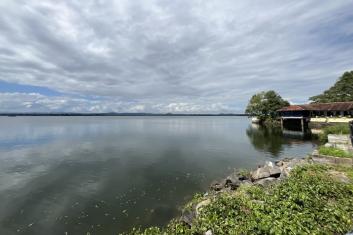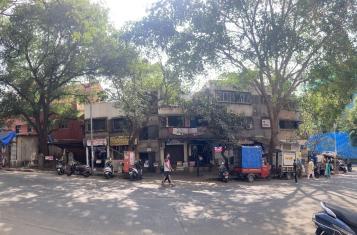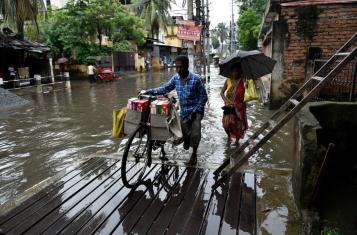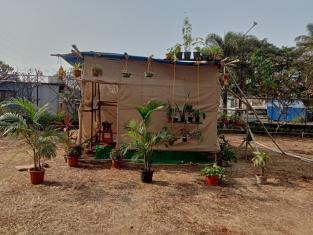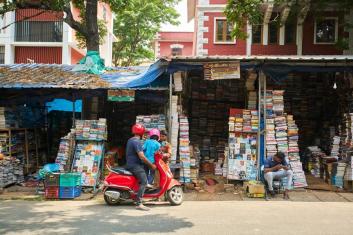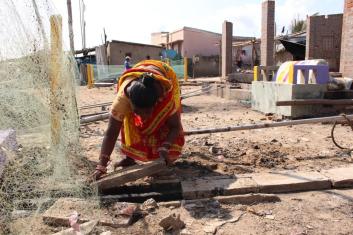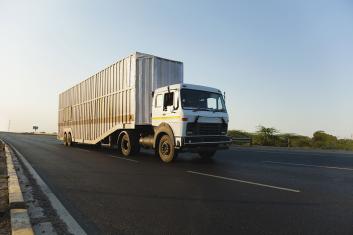Blogs
The blogs are part of WRI India’s mission to provide unbiased, expert analysis on the most important environmental issues facing the world today.
In today’s rapid-fire, fragmented information culture, we hope these insights will provide a measure of clarity to decision-makers worldwide.
-
Reaching for Urban Prosperity: A Public Space Opportunity
by , e -Cities serve as the engines and drivers of economic growth. They sit at the nexus of infrastructural and human resources, generating economic opportunity by providing economies of scale, infrastructure, attracting talent and skilled labor. However, these economic growth trajectories are primarily mapped by demand and supply – based on consumption and extraction. This extractive, non-regenerative model of growth is turning urban regions into key contributors to...
-
Worlds of Water: 5 Books to Understand India’s Water Systems
by -From the earliest known records of human civilizations to the current world map, water has been the critical element determining where habitations and city-regions flourished. Whether it be Mesopotamia, emerging between the riverine landscapes of the rivers Tigris and Euphrates, or the Harappa civilization on the Indus River in the Indian subcontinent, history has demonstrated that destinies of human settlements remain tied to their water systems- often dwindling as these vital ecosystems collapsed over time.
The relationship between water and human settlements endures, but much...
-
Restoration Champions Driving Impact: Operational Models for Sustainable Growth
by , e -Land restoration-based enterprises help protect forests, restore agricultural lands and common lands that are facing multiple challenges such as degradation, fragmentation, declining productivity, biodiversity loss and soil erosion. These enterprises leverage innovative technologies and practices to also provide resilient livelihood opportunities for local communities and increase their adaptability and preparedness against climate shocks.
The fourth edition of Land Accelerator South Asia – a unique program that supports land restoration-based businesses – features...
-
How Can We Preserve Trees on Private Lands?
by -A tamarind tree has been living on our ancestral plot for more than 150 years. It has been a member of our family for generations. Its branches arch over the terrace of our house. I grew up playing under this tree – eating both its ripened and still-raw, sweet and sour fruit, and sampling its flowers and tart leaves for good measure. The crown of the tree is wide enough to provide shade to the adjoining municipal school and offers respite to innumerable heat-afflicted pedestrians, including schoolchildren and hawkers. In a recent discussion on redeveloping our plot, the developer took it...
-
Differential Vulnerability and its Importance in Resilience Planning
by , e -India is the seventh most climate-vulnerable country in the world, with nine of its states among the top 50 most vulnerable regions globally. The country's cities are at the forefront of the climate crisis with more than 80% of the urban population living in hazard-prone districts....
-
5 Opportunities for Micro-greening in Low-income Urban Settlements
by , e -Climate change-induced events such as heat waves and floods severely impact the quality of life in urban areas. It can be financially disruptive and even fatal, disproportionately impacting settlements most vulnerable to climate risks. Greening of open spaces can be an important strategy for addressing such increasing urban heat and flood-related risks in cities. However, as our cities expand, rampant urbanization adversely impacts the availability of and access to such open spaces.
In Mumbai,...
-
Reading the City: Book Recommendations for Seeing Indian Cities Differently
by -“Cities, like dreams, are made of desires and fears, even if the thread of their discourse is secret, their rules are absurd, their perspectives deceitful, and everything conceals something else.” ― Italo Calvino, Invisible Cities
India’s growth trajectory reveals the sheer diversity in the nature, pace and scale of change across its urban centers. They are spread across the spectrum, from small village towns finding themselves on the cusp of being deemed urban, to members of the densest urban agglomerations in the world. Research has indicated the existence of multiple...
-
How Blue-Green Infrastructure Elevates Water Resilience: Story of the Penthakata Community
by -Situated along the coast of the Bay of Bengal, in Puri, Odisha, the Penthakata settlement relies on the sea for its livelihood. While men set sail for fishing, the narrow streets spanning through shacks and semi-pucca houses buzz with activities of daily living. Small, poorly ventilated houses and the need to share public utilities push women and children outdoors, to get fresh air or for cooking, showering, washing clothes and playing.
Like other women from the community, Chittama makes several trips to get water from the municipal public water taps for domestic use. Due to...
-
Decarbonizing the Aviation Sector: The Role of Hydrogen
by e -The 2023 United Nations Climate Change Conference (COP28) that concluded earlier this week saw delegates from across the world fly down to Dubai, leading to resurfacing of the dilemma of carbon emissions associated with flying to attend the climate conference. The aviation industry accounted for 2.4% of the global carbon...
-
Decoupling Road Freight from Emissions
by , e -India is one of the fastest-growing economies in the world, despite an ongoing global slowdown. This growth must happen without compromising on sustainability, which is a cornerstone of holistic development and critical to India meeting its net-zero targets.
Much of the decarbonizing focus is on the transport sector, which is responsible for...


